SWEDISH
SOUTH ASIAN STUDIES NETWORK
Newsletter 95:
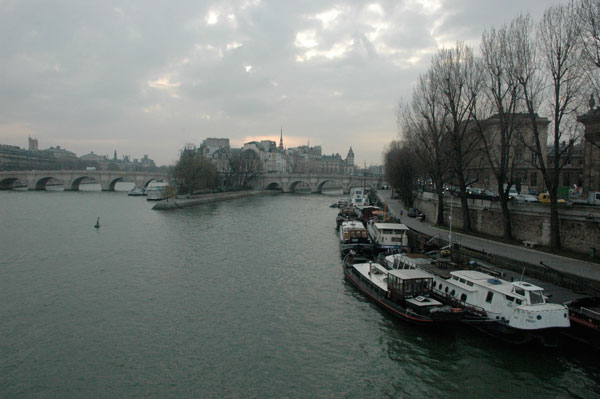 6 April 2009
6 April 2009
| Educational News |
| Politics and Business |
| South Asia related Culture |
| New and updated information |
• SASNET networking meetings at Jönköping and Växjö universities
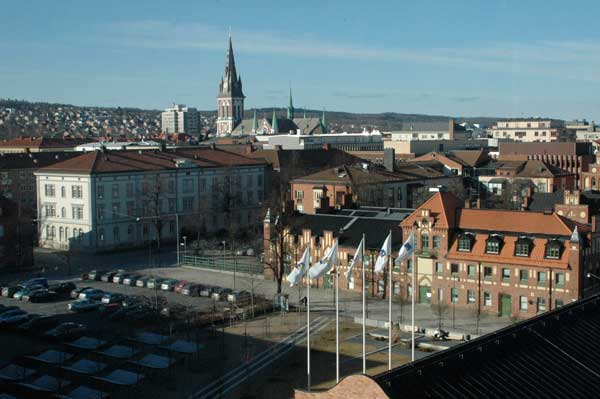 In mid-March 2009 SASNET’s deputy director Lars Eklund visited two universities in southern Sweden, Jönköping University and Växjö University. Networking is the main purpose of SASNET, and a regular feature of our activities therefore consists of visiting Swedish universities to meet with researchers and educationists involved in South Asia related research and/or educational collaboration projects.
On 19 March, Lars visited Jönköping University, one of the strongest in Sweden when it comes to internationalisation work including collaboration projects with South Asia. Lars met with international coordinators and researchers/educationists from all four schools of the university – Jönköping International Business School (JIBS); School of Education and Communication; School of Engineering; and School of Health Sciences.
In mid-March 2009 SASNET’s deputy director Lars Eklund visited two universities in southern Sweden, Jönköping University and Växjö University. Networking is the main purpose of SASNET, and a regular feature of our activities therefore consists of visiting Swedish universities to meet with researchers and educationists involved in South Asia related research and/or educational collaboration projects.
On 19 March, Lars visited Jönköping University, one of the strongest in Sweden when it comes to internationalisation work including collaboration projects with South Asia. Lars met with international coordinators and researchers/educationists from all four schools of the university – Jönköping International Business School (JIBS); School of Education and Communication; School of Engineering; and School of Health Sciences.
The most interesting South Asia related news at Jönköping University right now is the fact that JIBS has taken over the responsibility to develop a technical university in the Pakistani city of Sialkot. A project initially run by the Royal Institute of Technology (KTH) in Stockholm, but since KTH withdrew from the project it is now administered by Dr. Ramon Wyss, new Vice-president for International Affairs at JIBS. More information below.
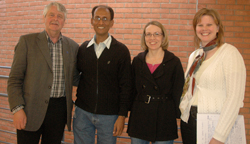 |
| Lars Eklund, Ashis Sengupta, Maria Olaussen and Piia Posti. |
The following day, 20 March, Lars visited Växjö University to meet researchers and educationists involved in South Asia projects at the School of Humanities and School of Social Sciences. The visit also coincided with a seminar by Dr. Ashis Sengupta, Professor of English at North Bengal University in Siliguri, India who had been invited to Växjö on a SASNET guest lecture programme grant (more information).
The most interesting news from Växjö is that the university is going to merge with Kalmar University on 1 January 2010. The organisation of faculties and institutions was decided upon as recently as 26 March 2009 (more information about the new merged university that will be named Linnaeus University).
Read Lars Eklund’s Report from the visit to Jönköping and Växjö universities.
• Bangladeshi Vice Chancellor visited SASNET’s root node office
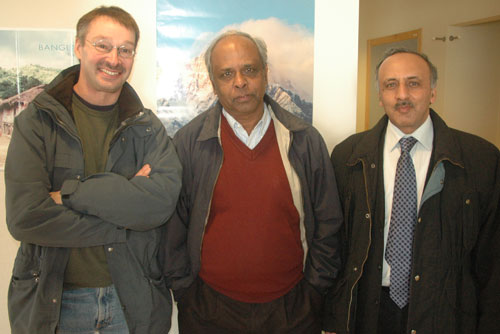 The Vice Chancellor from Jahangirnagar University in Bangladesh, Prof. Shariff Enamur Kabir, visited SASNET’s root node office in Lund on Wednesday 25 March 2009. He was accompanied by Professor Pradeep Mathur from the Dept. of Chemistry at the Indian Institute of Technology (IIT) in Mumbai, and Dr. Ebbe Nordlander, Dept. of Chemical Physics, Lund University. The three researchers are involved in a joint reserach project on ”Modelling of hydrodesulfurization reactions and development of new molecular hydrodesulfurization catalyst” that received a SASNET planning grant in 2008, the planning of which was carried out during the stay in Lund. They also met with Lund University’s Pro vice-chancellor Eva Åkesson to discuss a possible Memorandum of Understanding (MoU) between Lund University and Jahangirnagar University. The project partners are seen on the photo – from left to right Dr. Ebbe Nordlander, Professor Shariff Enamur Kabir and Professor Pradeep Mathur.
The Vice Chancellor from Jahangirnagar University in Bangladesh, Prof. Shariff Enamur Kabir, visited SASNET’s root node office in Lund on Wednesday 25 March 2009. He was accompanied by Professor Pradeep Mathur from the Dept. of Chemistry at the Indian Institute of Technology (IIT) in Mumbai, and Dr. Ebbe Nordlander, Dept. of Chemical Physics, Lund University. The three researchers are involved in a joint reserach project on ”Modelling of hydrodesulfurization reactions and development of new molecular hydrodesulfurization catalyst” that received a SASNET planning grant in 2008, the planning of which was carried out during the stay in Lund. They also met with Lund University’s Pro vice-chancellor Eva Åkesson to discuss a possible Memorandum of Understanding (MoU) between Lund University and Jahangirnagar University. The project partners are seen on the photo – from left to right Dr. Ebbe Nordlander, Professor Shariff Enamur Kabir and Professor Pradeep Mathur.
• More information about SASNET and its
activities
See SASNET’s page, http://www.sasnet.lu.se/sasnet.html
• South Asia related Linnaeus Palme exchange programme grants 2009-10
 On 20 March 2009, decisions
were taken about Linnaeus Palme exchange programme grants
for 2009-10.
The ninth round of applications for Linnaeus Palme grants,
for the contract period 1 July 2009–
30 June 2010, were decided upon by the Swedish International Programme
Office for Education and Training. Out of 260
projects given grants, 3 are with Bangladesh, 24 with India, 2
with Nepal, 2 with Pakistan, and 4 with Sri Lanka. Go
for the full list of Linnaeus Palme grants 2009 (as a pdf-file).
On 20 March 2009, decisions
were taken about Linnaeus Palme exchange programme grants
for 2009-10.
The ninth round of applications for Linnaeus Palme grants,
for the contract period 1 July 2009–
30 June 2010, were decided upon by the Swedish International Programme
Office for Education and Training. Out of 260
projects given grants, 3 are with Bangladesh, 24 with India, 2
with Nepal, 2 with Pakistan, and 4 with Sri Lanka. Go
for the full list of Linnaeus Palme grants 2009 (as a pdf-file).
Please note that SASNET provides additional value. Not only do we give you a list, but for most of the Swedish departments involved, SASNET has produced specially designed presentation pages with detailed information about the researchers and teachers involved in South Asia related projects within the specific department. A few department pages however still remain to be completed. See
separate SASNET list on South Asia related projects.
(Alltogether SASNET currently provides extensive information about South Asia projects at close to 250 Swedish university departments, a unique material. See the full list.
• Internship opportunity for Swedish students at research institution for Dalits/Adivasis
The Centre for Research and Education for Social Transformation (CREST), an autonomous institution under Government of Kerala (India) in Kozhikode offers internship opportunities for Swedish students. The interns will be working with a group of 40 graduates from Dalit/Adivasi and minority communities of Kerala who are undergoing Post Graduate Certificate Course for Professional Development at CREST. International /local travel expenses should be met by the candidates. The Interns will be based in Kozhikode (Calicut), Kerala. A monthly living allowance of Rs.6000/- (approximately 120 USD) will be given to the interns. During the internship, the candidates will stay for free at CREST student hostel in Calicut. Interns should meet the expenses for food. The application deadline is Monday 20 April 2009.
The internship will begin from mid-May 2009. Full information.
• Sialkot University project now administered by Jönköping University
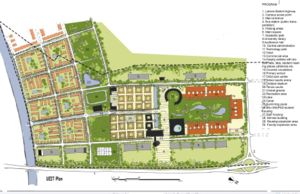 Jönköping University has taken over the responsibility to set up a new technical university, Sialkot University of Engineering Sciences & Technology, in the
industrial town of Sialkot in northern Pakistan. Previously the project was administered by the Royal Institute of Technology (KTH) in Stockholm, but due to the worsening security situation in Pakistan the KTH board last year decided to withdraw from the project.
Jönköping University has taken over the responsibility to set up a new technical university, Sialkot University of Engineering Sciences & Technology, in the
industrial town of Sialkot in northern Pakistan. Previously the project was administered by the Royal Institute of Technology (KTH) in Stockholm, but due to the worsening security situation in Pakistan the KTH board last year decided to withdraw from the project.
The Sialkot initiative originally came from the Pakistani government, which is
eager to boost the number of university graduates in the country,
especially in the sciences. Pakistan has taken upon itself to finance and build the
campus, whereas Swedish partners will be responsible for course content, university
management and quality control. Fields of study are supposed to include
electrical engineering, information technology, chemical engineering,
industrial economics and mechanical engineering. The Sialkot
University should also take in 20-30 PhD students per year. It was supposed to have been fully operational
already by the start of the 2008/2009 academic year.
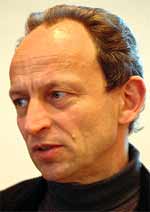 Prof. Ramon Wyss (photo to the right) has been in charge of the Sialkot project first at as Vice President of KTH and now at Jönköping University, where he has got a position as Vice-president for International Affairs at the Jönköping International Business School, JIBS.
Prof. Ramon Wyss (photo to the right) has been in charge of the Sialkot project first at as Vice President of KTH and now at Jönköping University, where he has got a position as Vice-president for International Affairs at the Jönköping International Business School, JIBS.
He is working towards a capacity
building programme, with Pakistani students who acquire master's
and doctoral degrees being invited back to teach subsequent intakes
of undergraduate students. Discussions are
also in progress
to establish an associated Industrial Park and a Business School,
and a Medical School. If all pieces
in the puzzle come together, the campus will grow into a university
town.
The Swedish involvement in the Sialkot university is part of a larger effort by the Government of Pakistan to improve the quality of higher
education in the country to the benefit of society. International cooperation was invited to establish nine new Universities
of Engineering Science & Technology
in Pakistan (UESTP). France, Germany, Austria, Italy, South
Korea, China and Japan were approached besides Sweden.
• NSU workshop series on South Asia in the 21st Century now running
![]() The Nordic Summer University held its first workshop on ”South Asia in the 21st Century: Explorations in Multidisciplinary Methodology” at the Nordic Institute of Asian Studies (NIAS) in Copenhagen 13–15 March 2009. The Nordic Summer
University (NSU) South Asian seminars programme runs during the period 2009–11.
It includes a number of winter sessions
and smaller thematic workshops at the yearly NSU summer
sessions. The aim is to connect presently dispersed scholars on
South Asian studies and upgrade the existing mass of Nordic PhD
students and younger researchers in the Nordic Summer University
activities.
The Nordic Summer University held its first workshop on ”South Asia in the 21st Century: Explorations in Multidisciplinary Methodology” at the Nordic Institute of Asian Studies (NIAS) in Copenhagen 13–15 March 2009. The Nordic Summer
University (NSU) South Asian seminars programme runs during the period 2009–11.
It includes a number of winter sessions
and smaller thematic workshops at the yearly NSU summer
sessions. The aim is to connect presently dispersed scholars on
South Asian studies and upgrade the existing mass of Nordic PhD
students and younger researchers in the Nordic Summer University
activities.
The theme for the first workshop was ”Democratic Values and Political Practices in South
Asia”. It was coordinated by
Stig Toft Madsen, Kenneth B Nielsen and Arild Engelsen Ruud. Full information about the March 2009 workshop, including a complete list of papers presented.
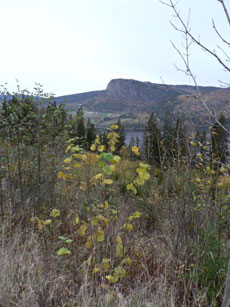 The second workshop in the series of Nordic Summer University (NSU) cluster workshops on ”South Asia in the 21st Century” will be held in Tyrifjord (photo to the right), Norway, 19–26 July 2009. The theme for this workshop will be ”South Asian Migration and Diaspora”.
It is coordinated by the researchers Peter B. Andersen, University of Copenhagen; Knut A. Jacobsen, University of Bergen; Igor Kotin, Kunstkamera, St. Petersburg, Russia; and Marianne
Qvortrup Fibiger, University of Aarhus. Among the issues to be studied are: – The History of the South Asian diasporas; – Migration patterns: – The interaction between diasporas and ”home” communities; and – Identities in the diaspora. More information about the Tyrisfjord workshop.
The second workshop in the series of Nordic Summer University (NSU) cluster workshops on ”South Asia in the 21st Century” will be held in Tyrifjord (photo to the right), Norway, 19–26 July 2009. The theme for this workshop will be ”South Asian Migration and Diaspora”.
It is coordinated by the researchers Peter B. Andersen, University of Copenhagen; Knut A. Jacobsen, University of Bergen; Igor Kotin, Kunstkamera, St. Petersburg, Russia; and Marianne
Qvortrup Fibiger, University of Aarhus. Among the issues to be studied are: – The History of the South Asian diasporas; – Migration patterns: – The interaction between diasporas and ”home” communities; and – Identities in the diaspora. More information about the Tyrisfjord workshop.
Later workshops in the NSU seminar series will focus on ”Environmental Challenges, Politics and Food
Production in South Asia” to be coordinated by
Tor Halfdan Aase and Pamela Pricein the winter 2009/10; on ”Religion and conflict in South Asia” to be coordinated by
Stig Toft Madsen, David Hansen and Peter B. Andersen in the summer 2010; on ”Releasing the Indian tiger – economical and political
implications globally and regionally of the opening of the Indian economy” to be coordinated by
Michael W. Hansen and Anthony D’Costa in the winter 2010/11; and a final workshop in the summer 2011 on a theme not yet decided upon, preliminarily to be coordinated by Sidsel Hansson, Catarina Kinnvall, Anna Lindberg, Igor Kotin, Sirpa
Tenhunen, Sanjiv Prakash and Sten Widmalm. Read the full proposal for the South Asia in the 21st Century NSU programme.
• Documentary films about Dalits in India and Nepal shown on Swedish Television
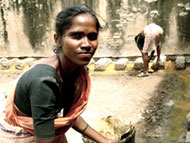 In 2006, the Danish Radio broadcasted a documentary series of five excellent TV programmes on Dalits in India and Nepal. The films are now also shown on Swedish TV (Kunskapskanalen). They are screened on Saturdays at 21.00 during the month of April 2009, with a repeat show the following Fridays at 23.00. The first programme (first shown on 4 April, with a repeat show on Friday 10 April) is a shocking story about Manual Scavengers in India. The following programmes focus on items such as Prostitution among Badi Women in Nepal (11 April); Debt slavery (18 April); Jogini Traditions in South India (25 April); and Caste Violence in Bihar (2 May). More information.
In 2006, the Danish Radio broadcasted a documentary series of five excellent TV programmes on Dalits in India and Nepal. The films are now also shown on Swedish TV (Kunskapskanalen). They are screened on Saturdays at 21.00 during the month of April 2009, with a repeat show the following Fridays at 23.00. The first programme (first shown on 4 April, with a repeat show on Friday 10 April) is a shocking story about Manual Scavengers in India. The following programmes focus on items such as Prostitution among Badi Women in Nepal (11 April); Debt slavery (18 April); Jogini Traditions in South India (25 April); and Caste Violence in Bihar (2 May). More information.
The films were produced with support from Danida. Additional information on the films, including photos and video clippings from the programmes, still appear on an impressive sub-site of the DR web site (with texts in Danish). Go for DR’s web site on ”De urørlige”.
• Global Bar seminar on Swedish development cooperation
![]() A well-attended Global Bar seminar focusing on the Swedish international development cooperation assistance was held in Stockholm on Thursday 12 March 2009. The Global Bar is an informal meeting place for people working with International issues, such as journalists, researchers and development workers, and regularly organised by the consultancy firm Global Reporting. The March 12 seminar was titled ”The Best in the World – The Worst in Sweden”. The panel consisted of Mr. Georg Andrén, Head of Sida’s department Samverkan med Aktörer (in charge of the Sida Civil Society Center); and the journalists
Claes Arvidsson and
Anna-Lena Lodenius. David Isaksson from Global Reporting was the moderator. Read a report from the seminar (in Swedish only).
A well-attended Global Bar seminar focusing on the Swedish international development cooperation assistance was held in Stockholm on Thursday 12 March 2009. The Global Bar is an informal meeting place for people working with International issues, such as journalists, researchers and development workers, and regularly organised by the consultancy firm Global Reporting. The March 12 seminar was titled ”The Best in the World – The Worst in Sweden”. The panel consisted of Mr. Georg Andrén, Head of Sida’s department Samverkan med Aktörer (in charge of the Sida Civil Society Center); and the journalists
Claes Arvidsson and
Anna-Lena Lodenius. David Isaksson from Global Reporting was the moderator. Read a report from the seminar (in Swedish only).
• Researchers want to preserve Bhopal factory as an industrial heritage building
 Dr. Jan af Geijerstam, till recently connected to the Division of History of Science and Technology at the Royal Institute of Technology (KTH) in Stockholm, is currently involved in an initiative to develop a collaboration project between Swedish and Indian artists and proponents of saving industrial heritage environments in mid-Sweden (Ådalen) and in Bhopal, India. They support NGO’s and activists in the city of Bhopal, that demand from UNESCO that the Union Carbide factory in Bhopal (photo) should be declared a heritage memorial building. This is a very sensitive issue that touches upon the whole question of sustainable and environmental friendly agriculture in India vs. chemical dependent agriculture that Union Carbide/Dow Chemicals represent.
Dr. Jan af Geijerstam, till recently connected to the Division of History of Science and Technology at the Royal Institute of Technology (KTH) in Stockholm, is currently involved in an initiative to develop a collaboration project between Swedish and Indian artists and proponents of saving industrial heritage environments in mid-Sweden (Ådalen) and in Bhopal, India. They support NGO’s and activists in the city of Bhopal, that demand from UNESCO that the Union Carbide factory in Bhopal (photo) should be declared a heritage memorial building. This is a very sensitive issue that touches upon the whole question of sustainable and environmental friendly agriculture in India vs. chemical dependent agriculture that Union Carbide/Dow Chemicals represent.
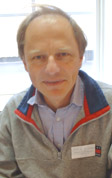 Dr. af Geijerstam (photo to the left) defended his doctoral dissertation titled ”Landscapes
of Technology Transfer. Swedish Ironmakers in India 1860–1864” at KTH in 2004. Now he works mostly as a kind of free-lance
researcher focusing on studies on Swedish Industrial History, but has kept his international contacts. He coordinates a collaboration effort between the International Committee for the Conservation of the Industrial Heritage (TICCIH) and the Modern Asian Architecture Network (mAAN). The latter organisation was established in 2000 as a loosely knit network of architectural researchers and specialists committed to study, preserve, and rehabilitate the modern architecture, townscape, and civil-engineering heritages in Asia. Its latest conference was held in New Delhi in February 2009, with the theme ”Asian Cities — Legacies of Modernity” (more information).
Dr. af Geijerstam (photo to the left) defended his doctoral dissertation titled ”Landscapes
of Technology Transfer. Swedish Ironmakers in India 1860–1864” at KTH in 2004. Now he works mostly as a kind of free-lance
researcher focusing on studies on Swedish Industrial History, but has kept his international contacts. He coordinates a collaboration effort between the International Committee for the Conservation of the Industrial Heritage (TICCIH) and the Modern Asian Architecture Network (mAAN). The latter organisation was established in 2000 as a loosely knit network of architectural researchers and specialists committed to study, preserve, and rehabilitate the modern architecture, townscape, and civil-engineering heritages in Asia. Its latest conference was held in New Delhi in February 2009, with the theme ”Asian Cities — Legacies of Modernity” (more information).
• Springtime organises election trip to India
The Swedish PR and Communication firm Springtime organises an Election Trip to India 9–17 May 2009. The participants are expected to be Swedish companies and institutions but also individuals with an interest to follow the 2009 Indian elections on site. 714 million Indians are heading to the polling booths in April and May to elect the 15th parliament, Lok Sabha. The last election day is May 13 and the results will be presented on May 16. During the election trip, a visit to a local state is included to see how local campaigning is carried out. The tour then proceeds to Delhi for meetings with members of parliament, politicians, media and business representatives during a custom-made two-day conference. Finally, a common election night party to follow the announcement of the election results will take place. Before the journey to India, Springtime will organise two seminars in Stockholm where Indian politics and business will be presented, and invited guest speakers will discuss today's India. Since March 2009, Mr. Gautam Bhattacharya, previously First Secretary at the Embassy of Sweden in New Delhi, works for Springtime as Communication consultant specialized in strategic communication focusing on India and global markets. Full information about the Election Tour.
• Kristian Berg Harpviken new Director for PRIO
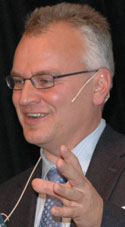 Dr. Kristian Berg Harpviken (photo to the right) has been appointed new Director at the International Peace Research Institute (PRIO) in Oslo, Norway. Harpviken is a respected peace researcher and Afghanistan expert. He holds a PhD in sociology, and his fields of research are conflict analysis, migration and landmines. Harpviken has been deputy director at PRIO since 2005, and has been associated with the institute since 1993. He also participates as Working Group leader at the Centre for the Study of Civil War (CSCW) at PRIO.
Harpviken will take over as Director from Stein Tønnesson 1st July, following the celebration in June of the 50th anniversary of PRIO. More information.
Dr. Kristian Berg Harpviken (photo to the right) has been appointed new Director at the International Peace Research Institute (PRIO) in Oslo, Norway. Harpviken is a respected peace researcher and Afghanistan expert. He holds a PhD in sociology, and his fields of research are conflict analysis, migration and landmines. Harpviken has been deputy director at PRIO since 2005, and has been associated with the institute since 1993. He also participates as Working Group leader at the Centre for the Study of Civil War (CSCW) at PRIO.
Harpviken will take over as Director from Stein Tønnesson 1st July, following the celebration in June of the 50th anniversary of PRIO. More information.
• Kathmandu Summer School on Religious Minorities
EURASIA-Net, a programme for ”Europe-South Asia Exchange on Supranational (Regional) Policies and Instruments for the Promotion of Human Rights and the Management of Minority Issues” (funded by the Seventh Framework Programme of the European Commission) invites participants to its Second Transregional Summer School to be held in Kathmandu, Nepal, 17–28 august 2009. EURASIA-Net was established in February 2008. The networking programme has a mission to improve cooperation and exchange between European and South Asian scholars and to improve circulation of South Asian research results in the field of supra-national instruments for the promotion of human and minority rights within the European scientific community and vice versa. Eventually it could lead up to the establishment of a ”South Asian Council on Minorities” within the SAARC organisation. The programme is coordinated by the Institute for Minority Rights at the European Academy Bozen/Bolzano (EURAC) in Italy. More information on EURASIA-Net.
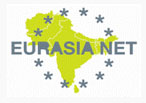 The focus of the 2009 Summer School will be Religious Minorities, an issue perceived as extremely relevant within public fora and civil society discourse in South Asia. Another key subject will be Nepal, where recent developments have opened the path to new constitutional reforms in Nepal. Moreover, lectures on the standards on minority and human rights in Europe and in South Asia (including the role of SAARC), soft law mechanisms, concepts of federalism and autonomy (including case studies, e.g., South Tyrol and Kashmir), indigenous rights and ethnic diversity both in Europe and South Asia will complete the overall programme. The Summer School is open to indicatively 20 researchers, civil servants, politicians, activists and other stakeholders (e.g. media) dealing with human and minority rights issues from Europe and South Asia. Deadline for applications is 31 May 2009. Venue: Dulikhel Mountain Resort, about 30 km from Kathmandu, Nepal. More information on the 2009 Summer School.
The focus of the 2009 Summer School will be Religious Minorities, an issue perceived as extremely relevant within public fora and civil society discourse in South Asia. Another key subject will be Nepal, where recent developments have opened the path to new constitutional reforms in Nepal. Moreover, lectures on the standards on minority and human rights in Europe and in South Asia (including the role of SAARC), soft law mechanisms, concepts of federalism and autonomy (including case studies, e.g., South Tyrol and Kashmir), indigenous rights and ethnic diversity both in Europe and South Asia will complete the overall programme. The Summer School is open to indicatively 20 researchers, civil servants, politicians, activists and other stakeholders (e.g. media) dealing with human and minority rights issues from Europe and South Asia. Deadline for applications is 31 May 2009. Venue: Dulikhel Mountain Resort, about 30 km from Kathmandu, Nepal. More information on the 2009 Summer School.
• Heidelberg Summer School in Spoken Sanskrit
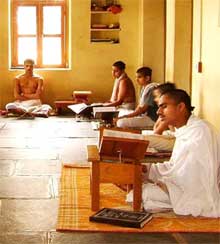 For the tenth year in a row, the Dept. of Classical Indology at the South Asia Institute, Heidelberg, Germany announces a Summer School in Spoken Sanskrit, 3–21 August 2009. Since its start back in the year 2000 it has attracted students and lecturers of Indological, Religious and South Asian Studies from all over the world to practice Sanskrit in a different way: Under the guidance of Dr. Sadanada Das, a Sanskrit native speaker from Benares, all those with a basic knowledge of Sanskrit grammar and vocabulary shall learn to carefully listen, to accurately pronounce and to slowly speak and recite this beautiful language. The four-week intensive course helps strengthening the skills, making the study of Sanskrit a lively and creative experience. Prerequisites: Elementary Sanskrit and English. Deadline for applications is 30 April 2009.
For the tenth year in a row, the Dept. of Classical Indology at the South Asia Institute, Heidelberg, Germany announces a Summer School in Spoken Sanskrit, 3–21 August 2009. Since its start back in the year 2000 it has attracted students and lecturers of Indological, Religious and South Asian Studies from all over the world to practice Sanskrit in a different way: Under the guidance of Dr. Sadanada Das, a Sanskrit native speaker from Benares, all those with a basic knowledge of Sanskrit grammar and vocabulary shall learn to carefully listen, to accurately pronounce and to slowly speak and recite this beautiful language. The four-week intensive course helps strengthening the skills, making the study of Sanskrit a lively and creative experience. Prerequisites: Elementary Sanskrit and English. Deadline for applications is 30 April 2009.
• Heidelberg Intensive Course in Nepali
In August 2009, the South Asia Institute at the University of Heidelberg also organises an Intensive Course in Nepali. The experienced teacher Laxmi Nath Shrestha from Kathmandu has taught Nepali to generations of both students and researchers and has proven that he can make people start speaking Nepali in short time. Starting from the first day, this course will be held in Nepali only. The course runs during the period 3–28 August. Deadline for applications is 30 April 2009.
• More information about South Asia related
research at Swedish and Nordic universities
See SASNET’s page, http://www.sasnet.lu.se/research.html
• New BSc programme in Development Studies at Lund University
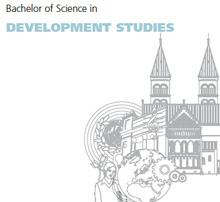
Lund University is starting a new Bachelor of Science programme in Development Studies with a major in Economic History, Human
Geography, Political Science or Sociology from September 2009. The programme is interdisciplinary and focuses on economic, social and political processes and their linkages to development cooperation. The duration of the programme is three years. It is jointly organised by the Dept. of Social and Economic Geography; Dept. of Sociology; Dept. of Political Science; and Dept. of Economic History. Last date of application is 15 April 2009. More information about the Programme.
• Stockholm University offers Internet Hindi course in the Fall 2009
In the Fall 2009, an entirely new 30 ECTS credits Hindi course will be introduced at Stockholm University. The course will be based on Internet distance learning. The teachers are Roberto Menkes and Mirja Juntunen from the Division of South and Central Asian Studies (Section for Indology) at the Department of
Oriental Languages. Last date for applications is 15 April 2009. More information.
The Section for Indology runs educational courses on
the ancient as well as modern languages and cultures of
South Asia, with special emphasis on India, up to the level
of Bachelors and Masters degrees. The Indology
courses are separated into one track specialized
on Ancient and Medieval India – with Sanskrit studies, and another
track specialized on Modern India –
with Hindi studies. However, during the Spring 2009, only the first course is running. More
information on the courses.
Besides, a 15 ECTS credits basic course in Practical Hindi is taught during the Spring 2009. The teacher is Jasmin Mandani.
For some years, the section has also regularly organised 7.5 ECTS credits summer courses, one basic course in Hindi, with Jasmin Mandani as the teacher (see the course plan). It is however cancelled for the summer 2009. Instead another course on Modern South Asia is arranged, with the journalist and writer Bo Kage Carlsson as teacher (more information).
• Comparative Anthropological course on Indian and China at Stockholm University
The Dept. of Social Anthropology, Stockholm University organises a 15 ECTS credits course on ”China and India: Tradition, Modernity and Power” in the Fall semester 2009. The course is taught in Swedish. Last date for applications is Wednesday 15 April 2009. Contact person is Dr. Per Ståhlberg. More information.
• Course on Changing
India and Ourselves for teacher training students in Stockholm
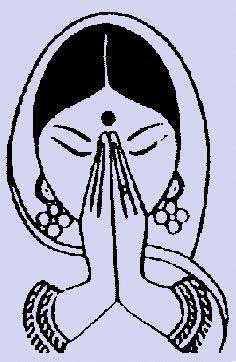 The Dept. of Educational Science with an emphasis on Humanities and Social Science (UHS), Stockholm University, a new department created after the merger of the Stockholm Institute of Education with Stockholm University on January 1, 2008, organises a 15 ECTS credits course titled ”Changing
India and Ourselves” every year during
a part of the Spring semester (January–March). The course has been developed out
of a course titled ”Changing South” that Dr. Jim Walch
has run successfully at the Stockholm Institute of Education since 1993. The course consists of two parts, first five weeks
field studies in Tamil Nadu, India, where the students should
confront, analyse and reflect upon the various patterns of poverty
and domination that can be found in the South and in the relation
to the richer parts of the world; and then five weeks literature
studies and seminars in Sweden. The next course will be run in the Spring 2010. Last date for applications is 15 October 2009. More
information.
The Dept. of Educational Science with an emphasis on Humanities and Social Science (UHS), Stockholm University, a new department created after the merger of the Stockholm Institute of Education with Stockholm University on January 1, 2008, organises a 15 ECTS credits course titled ”Changing
India and Ourselves” every year during
a part of the Spring semester (January–March). The course has been developed out
of a course titled ”Changing South” that Dr. Jim Walch
has run successfully at the Stockholm Institute of Education since 1993. The course consists of two parts, first five weeks
field studies in Tamil Nadu, India, where the students should
confront, analyse and reflect upon the various patterns of poverty
and domination that can be found in the South and in the relation
to the richer parts of the world; and then five weeks literature
studies and seminars in Sweden. The next course will be run in the Spring 2010. Last date for applications is 15 October 2009. More
information.
• Training
Programme on Strengthening Midwifery Competence
in Sexual and Reproductive Health
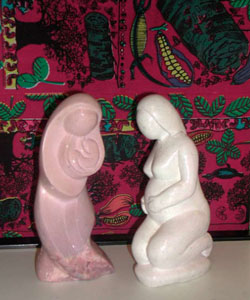 The Division of Reproductive and Perinatal Health Care, Uppsala University hosts an Advanced International Training
Programme on ”Strengthening Midwifery Competence
in Sexual and Reproductive Health
and Services” (funded by the Swedish International
Development Cooperation Agency, Sida), to be held in
two parts, first in the October 2009 and then continued in August–September 2010.
The programme is designed for professional
midwives in Asia who have
a basic education equivalent to
WHO/ICM/FIGO defined required
competence. The participants
should hold positions that have an
influence on ongoing issues related
to SRHR. A team of three participants
(representing clinical work,
education and policy) from each
country will be preferred.
Applicants should have a planned
or an ongoing SRHR project, supported
and approved by the employer.
The overall programme objective is to
strengthen midwives’ competence in
countries where maternal morbidity
and mortality are as highest, that is in South Asia and sub-Saharan Africa. The programme is organized as a joint venture between the Division of International Health (IHCAR) at Karolinska
Institutet; International Maternal and Child Health (IMCH), Dept. of Women’s and Children’s
Health at Uppsala University; and the Swedish Association of Midwives. Closing date for application is 1
May 2009. Full information including application form (as a pdf-file).
The Division of Reproductive and Perinatal Health Care, Uppsala University hosts an Advanced International Training
Programme on ”Strengthening Midwifery Competence
in Sexual and Reproductive Health
and Services” (funded by the Swedish International
Development Cooperation Agency, Sida), to be held in
two parts, first in the October 2009 and then continued in August–September 2010.
The programme is designed for professional
midwives in Asia who have
a basic education equivalent to
WHO/ICM/FIGO defined required
competence. The participants
should hold positions that have an
influence on ongoing issues related
to SRHR. A team of three participants
(representing clinical work,
education and policy) from each
country will be preferred.
Applicants should have a planned
or an ongoing SRHR project, supported
and approved by the employer.
The overall programme objective is to
strengthen midwives’ competence in
countries where maternal morbidity
and mortality are as highest, that is in South Asia and sub-Saharan Africa. The programme is organized as a joint venture between the Division of International Health (IHCAR) at Karolinska
Institutet; International Maternal and Child Health (IMCH), Dept. of Women’s and Children’s
Health at Uppsala University; and the Swedish Association of Midwives. Closing date for application is 1
May 2009. Full information including application form (as a pdf-file).
• Biskops-Arnö organises trainee programme on Ecology and Global Solidarity
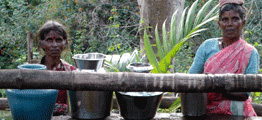 The folk high school Nordens Folkhögskola Biskops-Arnö organises a
36 weeks trainee programme on Ecology
and Global Solidarity during the period August 2009 – May 2010.
The programme is intended for students who already have a degree in development studies or environmental studies. It is organised by Nordens Folkhögskola in collaboration with the Swedish
NGO Framtidsjorden and
its network in India. The costs are fully funded by the Swedish International Development Cooperation Agency, Sida. The first part of the course consists of nine weeks of studies and preparations at Sida Civil Society Course Centre in Härnösand, upon which follows five months of practical work in India, where
the students will work with local organisations engaged in projects to create an ecologically and socially
sustainable society. Finally, the students will do six weeks external information work in Sweden. A total number of eight partcipants will be accepted for the programme. Before the actual programme starts, the students will have a possibility to go for an intensive Tamil language training course, also held at the Sida Course Centre in Härnösand. Last date for applications is Friday 17 April 2009. The course leader is Mr. Robert
Norman. More information.
The folk high school Nordens Folkhögskola Biskops-Arnö organises a
36 weeks trainee programme on Ecology
and Global Solidarity during the period August 2009 – May 2010.
The programme is intended for students who already have a degree in development studies or environmental studies. It is organised by Nordens Folkhögskola in collaboration with the Swedish
NGO Framtidsjorden and
its network in India. The costs are fully funded by the Swedish International Development Cooperation Agency, Sida. The first part of the course consists of nine weeks of studies and preparations at Sida Civil Society Course Centre in Härnösand, upon which follows five months of practical work in India, where
the students will work with local organisations engaged in projects to create an ecologically and socially
sustainable society. Finally, the students will do six weeks external information work in Sweden. A total number of eight partcipants will be accepted for the programme. Before the actual programme starts, the students will have a possibility to go for an intensive Tamil language training course, also held at the Sida Course Centre in Härnösand. Last date for applications is Friday 17 April 2009. The course leader is Mr. Robert
Norman. More information.
• Ljungskile folk high school organises Jharkhand course
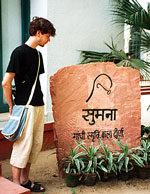 A
new World course (”Världens kurs med
Indienresa 2008”) on Justice, Peace and Environment,
including a three weeks tour to north India, will be arranged by
Ljungskile Folk High school during the period 17 August – 18 December
2009. The tour includes a three weeks stay at the village folk
high school Jagriti Vihara in Ranchi, Jharkhand. Last date for applications is Friday 24 April 2009. The course leader is Ms. Kajsa Perneman. More
information.
A
new World course (”Världens kurs med
Indienresa 2008”) on Justice, Peace and Environment,
including a three weeks tour to north India, will be arranged by
Ljungskile Folk High school during the period 17 August – 18 December
2009. The tour includes a three weeks stay at the village folk
high school Jagriti Vihara in Ranchi, Jharkhand. Last date for applications is Friday 24 April 2009. The course leader is Ms. Kajsa Perneman. More
information.
• Hålland folk high school offers Development Studies course
Hållands Folkhögskola, a Christian folk high school in Åre, Jämtland, organises a
one year Development studies course (”U-landslinjen”) every year, starting in August. The course includes a two months stay in either India or Tanzania during the Spring semester. The subjects taught include Missionary research, Hindi (or Swahili), Development studies, and Cultural understanding. Deadline for applications to the 2009/10 course is 30 April 2009. The course leader is Mr. Hans Bolin. More
information.
• Time to apply for Österlen folk high school’s India/South Asia course
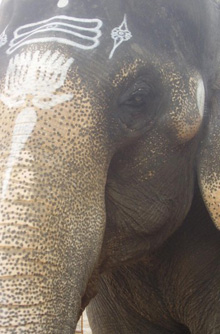 A
one-year course on India/South
Asia is arranged every
year since 2001. Till 2007, it was organised as an academic undergraduate social science course in co-operation with the Dept.
of Sociology at Lund University, but from 2008 is run independently by Österlen Folk High School (but with some of the teachers coming from Lund University). A
new programme will start in August 2009, with field work in south
India during January–April
2010. After an initial common course at Kerala the students
visit different places in India and Bangladesh where
they make individual field work. The students give regular
reports through Internet travel diaries. The course leader is Mr. Jens Karlsson. More
information.
A
one-year course on India/South
Asia is arranged every
year since 2001. Till 2007, it was organised as an academic undergraduate social science course in co-operation with the Dept.
of Sociology at Lund University, but from 2008 is run independently by Österlen Folk High School (but with some of the teachers coming from Lund University). A
new programme will start in August 2009, with field work in south
India during January–April
2010. After an initial common course at Kerala the students
visit different places in India and Bangladesh where
they make individual field work. The students give regular
reports through Internet travel diaries. The course leader is Mr. Jens Karlsson. More
information.
• More information about South Asia related
education at Swedish and Nordic universities
See SASNET’s page, http://www.sasnet.lu.se/education.html
• Vilnius conference on Texts and Practices of South Asian Art
The Second Vilnius Conference on Topics in the Study of Asia will be held in Vilnius, Lithuania 4–6 June 2009. The theme for the 2009 conference, organised by the Centre of Oriental Studies at Vilnius University, will be ”Texts and Practices of South Asian Art”. The conference aims to bring together scholars from different countries for an inter-disciplinary discussion of various aspects of
the history of practices and histories of texts in South Asian art.
The organizers welcome papers from historians, anthropologists, philosophers, and historians of art and religion that are based on original research in specific issues.
The peer-reviewed papers based on the Conference presentations will be published in the journal Acta Orientalia Vilnensia. Deadline for registration is Friday 17 April 2009. More information.
• 4th Nordic workshop on Peace and Development in Sri Lanka to be held in June
The 4th annual Nordic workshop on Peace and Development in Sri Lanka will
be held at the University of Copenhagen, 11–12 June 2009. Please note: Changed dates.
Last year Oslo hosted a large and very successful conference with many invited speakers, but this year the organisers return to the smaller workshop format aiming primarily at strengthening the Nordic/European Sri Lanka scholars’ community. A larger international conference will take place in Sri Lanka later in 2009. The programme will be organised in three thematic and one open session: Theme I: Empirical and theoretical explorations of conflict, peace and development;
Theme II: Political and ethical issues of conducting research;
Theme III: Conflict and peace in popular culture; and
Theme IV: Other issues and perspectives.
All presentations will be in plenary sessions.
Participants without a paper are expected to contribute as chairs/discussants. The number of participants is limited to approximately 30.
Deadline for registration, including abstract was 1 April 2009. More information.
• Copenhagen conference on South Asian Drama: Old Actors, New Scripts
 The Asian Dynamics Initiative at the University of Copenhagen invites to its first South Asia Network Conference that will be held 18–19 June 2009. The theme for the conference will be ”South Asian Drama: Old Actors, New Scripts.
Preparations of a new research agenda”. The conference will address how a range of themes change the frames for research and initialise new cross-disciplinary research agendas by the formation of targeted research groups to address these problems from multidisciplinary approaches. It is primarily aimed at researchers in the public or the private sector, but is open to all interested persons. Paper contributions are invited on the state-of-the arts and how to proceed, and buzz groups on the following broad themes: – Political violence, political stability and political futures; – The implications of Cultural Changes; and – The political economy of economic development in contemporary South Asia. Deadline for registration is 1 May 2009. More information.
The Asian Dynamics Initiative at the University of Copenhagen invites to its first South Asia Network Conference that will be held 18–19 June 2009. The theme for the conference will be ”South Asian Drama: Old Actors, New Scripts.
Preparations of a new research agenda”. The conference will address how a range of themes change the frames for research and initialise new cross-disciplinary research agendas by the formation of targeted research groups to address these problems from multidisciplinary approaches. It is primarily aimed at researchers in the public or the private sector, but is open to all interested persons. Paper contributions are invited on the state-of-the arts and how to proceed, and buzz groups on the following broad themes: – Political violence, political stability and political futures; – The implications of Cultural Changes; and – The political economy of economic development in contemporary South Asia. Deadline for registration is 1 May 2009. More information.
• Kerala conference on Rethinking Humanities in the Age of the ‘Visual’
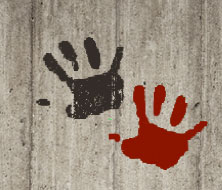 An International Conference on Humanities in the 21st Century, with the theme ”Rethinking Humanities in the Age of the ‘Visual’” will be held in Thrissur, Kerala, India 27–28 June 2009. The conference is organised by the Centre for Performance Research and Cultural Studies (C PRACSIS), and is an attempt to interrogate how the future of humanities can be traced and interpreted from various academic and philosophical quarters, and the ways in which interdisciplinary endeavours in all realms of knowledge respond to this effort. The fact that one of the major paradigms which re-organized many disciplines, including social sciences in the last century was the paradigm of visual culture and this issue has been crucial in designing the theme of this conference. The age of the ‘visual’, with its alteration of the priorities of modernity and the privileging of the spectacle incites serious reconsideration of Humanities within the contexts of the cultural practices of 21st century. Deadline for submission of abstracts is abstracts 20 April 2009.
An International Conference on Humanities in the 21st Century, with the theme ”Rethinking Humanities in the Age of the ‘Visual’” will be held in Thrissur, Kerala, India 27–28 June 2009. The conference is organised by the Centre for Performance Research and Cultural Studies (C PRACSIS), and is an attempt to interrogate how the future of humanities can be traced and interpreted from various academic and philosophical quarters, and the ways in which interdisciplinary endeavours in all realms of knowledge respond to this effort. The fact that one of the major paradigms which re-organized many disciplines, including social sciences in the last century was the paradigm of visual culture and this issue has been crucial in designing the theme of this conference. The age of the ‘visual’, with its alteration of the priorities of modernity and the privileging of the spectacle incites serious reconsideration of Humanities within the contexts of the cultural practices of 21st century. Deadline for submission of abstracts is abstracts 20 April 2009.
• Sixth International workshop on Tamil Epigraphy in Paris
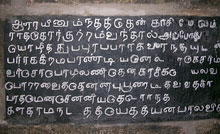 The sixth International workshop on Tamil Epigraphy will be held 29 June to 10 July 2009 at Ecole Pratique des Hautes Etudes, Section des Sciences historiques et philologiques, Paris, France. This special program, part of the regular seminar, is organised as requested by many researchers on humanities working on Tamil in different countries. The workshop is free, but interested scholars need to register to Dr. Appasamy Murugaiyan. The workshop is divided into two sessions: beginner (June 29 to July 3) and
intermediate/advanced (July 6 to 10). Participants may sign up for either or both sessions.
The first session: (29 June to 3 July) is designed for those who have not studied Tamil
inscriptions previously. The lectures will cover the following subjects:
– History of Tamil epigraphy, the Tamil epigraphic culture; – Evolution of Tamil scripts; – Estampage making, digital documentation and preservation of inscriptions; and – Structure of epigraphic texts, methods of analysis and interpretation. The second session (July 6 to 10) will focus on reading and interpretation of selected inscriptions
from Chola, Pallava, Pandya and Vijayanagara dynasties (7th to 16th centuries). More information (as a pdf-file).
The sixth International workshop on Tamil Epigraphy will be held 29 June to 10 July 2009 at Ecole Pratique des Hautes Etudes, Section des Sciences historiques et philologiques, Paris, France. This special program, part of the regular seminar, is organised as requested by many researchers on humanities working on Tamil in different countries. The workshop is free, but interested scholars need to register to Dr. Appasamy Murugaiyan. The workshop is divided into two sessions: beginner (June 29 to July 3) and
intermediate/advanced (July 6 to 10). Participants may sign up for either or both sessions.
The first session: (29 June to 3 July) is designed for those who have not studied Tamil
inscriptions previously. The lectures will cover the following subjects:
– History of Tamil epigraphy, the Tamil epigraphic culture; – Evolution of Tamil scripts; – Estampage making, digital documentation and preservation of inscriptions; and – Structure of epigraphic texts, methods of analysis and interpretation. The second session (July 6 to 10) will focus on reading and interpretation of selected inscriptions
from Chola, Pallava, Pandya and Vijayanagara dynasties (7th to 16th centuries). More information (as a pdf-file).
• Copenhagen workshop on Islamization of Knowledge and Science
A workshop on ”Islamization of Knowledge and Science, and Madrasas in the Modern Muslim World” will be held for PhD candidates in Copenhagen, Denmark 29–30 June 2009. The workshop is organised by the Research School of Regional Studies based at the Dept. of Cross-Cultural and Regional Studies, Copenhagen University. It focuses on the efforts by Muslim scholars in the recent decades to islamizise science, and the role the classic Madrasa institution plays in the modern World. Prominent international researchers have accepted an invitation to present papers to the workshop aimed at PhD students. Among the presenters are Professor Tariq Rahman, Director for the National Institute of Pakistan Studies, Quaid-i-Azam University, Islamabad; and Dr. Ziauddin Sardar, one of the founders of the International Institute of Islamic Thought (IIIT), headquartered in Virginia, USA. Swedish participants are
Dr. Pia Karlsson from the Institute of International Education (IIE), Stockholm University; and Dr. Leif Stenberg, Centre for Middle Eastern Studies, Lund University. More information about the workshop (in Danish only).
• 18th New Zealand Asian Studies Society International Conference
The 18th New Zealand Asian Studies Society International Conference will be held at Victoria University of Wellington, New Zeeland on 6–8 July 2009. The New Zealand Asian Studies Society (NZASIA), established in 1974, seeks to encourage the spread of knowledge about Asia, its history, its culture and its role in international affairs. With the recent opening of the New Zealand South Asia Centre at the University of Canterbury in Christchurch (inaugurated on Wednesday 18 March 2009) there will be more focus on South Asia within NZASIA). Official deadline for submitting abstracts to the conference is 31 March. Professor Sugata Bose, Harvard University, USA will deliver the keynote address titled 'Turbulent Passages from the Indian Ocean to the Pacific: Negotiating the Cross-Currents of Inter-Regional and Global Histories'. Venue: Victoria University,
Downtown (Pipitea) Campus. Wellington. More information.
• Third Critical Studies Conference in Kolkata
The Third Critical Studies Conference will be held in Kolkata, India 11–12 September 2009. The conference, organised by the Mahinirban/Calcutta Research Group (CRG) will focus on ”Empires, States, and Migration”. Scientific disciplines will help to understand some of the questions raised, inter-disciplinary approaches will help even more. Critical ways of interrogating and analysing will enable the participants to go further and allow them to raise new questions while making sense of the earlier ones. Deadline for submitting proposals for panels and papers will be 15 April 2009. More information.
• Frankfurt workshop on transnational ideas in South Asia
A Workshop on ”Local Modernities? Articulating transnational ideas in South Asia” will be held in Frankfurt am Main 30 September – 3 October 2009. The workshop is part of the 2009 German Anthropological Association (GAA) yearly Conference, focusing on ”Cultural Appropriation: Assimilation – Adaptation – Camouflage”. The South Asia workshop focuses on how transnational ideas form dichotomies with local conceptions. For example, recent threats against love couples on Valentine’s Day have become another means to showcase fundamentalist Hinduist values in Karnataka, South India. Less sensationally, residents of Chandigarh in North India negotiate the city’s modernist architecture within an opposition of “modernness” to vernacular design, the longstanding claim to the “modernity” of Chandigarh having become a “tradition” in the city itself. Papers based on anthropological case studies in urban as well as rural settings, concentrating on the articulation of transnational ideas are invited. Deadline for submission of abstracts is 30 May 2009. More information.
• Hyderabad conferenece on Socio-Cultural Approaches to Translation
An International Conference on “Socio-Cultural Approaches to Translation: Indian and European Perspectives” will be held at the University of Hyderabad (UoH), India on 28–30 October 2009. It is jointly organised by the Centre for Study of Foreign Languages, School of Humanities, UoH, and Université de Bretagne-Sud, Lorient Cédex, France. The aim of the conference is to bring together Indian and non-Indian perspectives on translation with a view to setting up a platform for discussion, comparison and long-term collaboration. It aims to analyze how different cultures interact and interfere with one another through translation. Deadline for the submission of abstracts is 31 May 2009. More information.
• New Delhi workshop on Studying the Indian Ocean
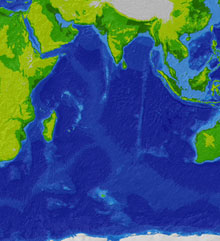 An international workshop on ”Studying the Indian Ocean: New Methodological Approaches and Writings Connected Histories” will be held in New Delhi 30 November – 4 December 2009. The workshop is jointly organised by Jamia Millia Islamia University, New Delhi; the Dutch research programme SEPHIS (South-South exchange programme for research on the history of development); and the Centre For Indian Studies In Africa at University of the Witwatersrand, South Africa. The workshop is open to pre-doctoral and early doctoral students registered at universities in
the South (Africa, Asia, the Caribbean, and Latin America). The Indian Ocean has in recent years emerged as a vital area of study and analysis inviting
attention from historians, anthropologists, social scientists and cultural studies scholars. How can we meaningfully understand the notion of multi-culturalism
in the Indian Ocean? The workshop
intends to address such issues by drawing on emerging analysis of transnationalism,
universalism and regimes of circulation in the Indian Ocean. It will be organized around lectures by senior international scholars and discussions of presentations by the participating students. Last date for submission of applications is 1
May 2009. Venue: Jamia Millia Islamia, New Delhi, India. More information.
An international workshop on ”Studying the Indian Ocean: New Methodological Approaches and Writings Connected Histories” will be held in New Delhi 30 November – 4 December 2009. The workshop is jointly organised by Jamia Millia Islamia University, New Delhi; the Dutch research programme SEPHIS (South-South exchange programme for research on the history of development); and the Centre For Indian Studies In Africa at University of the Witwatersrand, South Africa. The workshop is open to pre-doctoral and early doctoral students registered at universities in
the South (Africa, Asia, the Caribbean, and Latin America). The Indian Ocean has in recent years emerged as a vital area of study and analysis inviting
attention from historians, anthropologists, social scientists and cultural studies scholars. How can we meaningfully understand the notion of multi-culturalism
in the Indian Ocean? The workshop
intends to address such issues by drawing on emerging analysis of transnationalism,
universalism and regimes of circulation in the Indian Ocean. It will be organized around lectures by senior international scholars and discussions of presentations by the participating students. Last date for submission of applications is 1
May 2009. Venue: Jamia Millia Islamia, New Delhi, India. More information.
• Other conferences connected to South Asian
studies arranged all over the World
See SASNET’s page, http://www.sasnet.lu.se/conferences.html#conf
Important lectures and seminars in Scandinavia
• Igor Kotin lectures about the Hindu diaspora
Dr Igor Kotin from the Kunstkamera, University of St. Petersburg, Russia will give a
public lecture titled ”Studying the Hindu diaspora” in Oslo on Wednesday 15 April 2009, 10.15–12.00. Dr Kotin has been
invited by the Institute of Cultural Studies and Oriental Languages (IKOS), University of Oslo. The lecture will be in English. Venue: Seminar room 2, Georg Sverdrup building (i.e. the new University library
on Blindern campus), Oslo.
• CPAS lecture by Camilla Orjuela on the war in Sri Lanka
Dr. Camilla Orjuela, Division of Peace and Development Research (PADRIGU), Gothenburg University, holds a CPAS lecture at Stockholm University about ”Peace through War. On the Humanitarian Crisis and the Future” (Fred genom krig i Sri Lanka? Om den humanitära krisen och framtiden) in Stockholm on Wednesday 15 April 2009, 15–17. The seminar is part of an open lecture series that the Center for Pacific Asia Studies (CPAS) organises every week. Venue: Auditorium, Dept. of Oriental Languages, Stockholm University, Kräftriket 4 A.
• Oslo lecture on Greek and Indian Antiquities
Jens Braarvig, Dept. of Culture Studies and Oriental Languages, University of Oslo will hold a lecture on ”The Greek Antiquity and the Indian Antiquity – Two Separate Worlds?” in Oslo on Tuesday 21 April 2009, 16.15–18.00. The event is organised by the Indological Student's Union at the University of Oslo, an interdisciplinary forum for students and others with an interest in Indology and South Asia. The lecture will be held in Norwegian language. Venue: Seminar room 10, P. A. Munchs hus, Blindern, Oslo.
• Copenhagen lecture on Economic Development in India and China
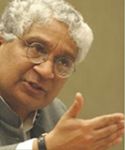 Deepak Nayyar, Professor of Economics at Jawaharlal Nehru University (JNU), New Delhi, India will hold a lecture in Copenhagen on ”Economic Development in India and China” on Wednesday 22 April 2009, 14.00–15.30. The seminar is organised by the
Asia Research Centre at the Copenhagen Business School (CBS). Prof. Nayyar analyses the economic performance of India and China during the second half of the twentieth century, situated in a longer term historical perspective, to explore the similarities and differences in their development experience. In conclusion, the lecture reflects upon the nature of the relationship between outcomes in development and thinking about development. Venue:
CBS, Room 408, Porcelænshaven 26, Frederiksberg, Copenhagen. More information.
Deepak Nayyar, Professor of Economics at Jawaharlal Nehru University (JNU), New Delhi, India will hold a lecture in Copenhagen on ”Economic Development in India and China” on Wednesday 22 April 2009, 14.00–15.30. The seminar is organised by the
Asia Research Centre at the Copenhagen Business School (CBS). Prof. Nayyar analyses the economic performance of India and China during the second half of the twentieth century, situated in a longer term historical perspective, to explore the similarities and differences in their development experience. In conclusion, the lecture reflects upon the nature of the relationship between outcomes in development and thinking about development. Venue:
CBS, Room 408, Porcelænshaven 26, Frederiksberg, Copenhagen. More information.
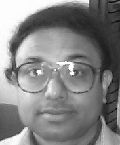 • Two lectures by Pranab Bardhan in Copenhagen
• Two lectures by Pranab Bardhan in Copenhagen
Pranab Bardhan, Professor of Economics at the University of California, Berkeley, USA will give two public guest lectures at Copenhagen University on 23 and 24 April 2009. Prof. Bardhan is one of the most influential development economists of his generation. He has now been invited to visit the Development Economics Research Group (DERG) at the Dept. of Economics, University of Copenhagen. The two lectures are connected under the common title ”Awakening Giants, Feet of Clay: A Comparative Economic Assessment of the Rise of China and India”, but they can be followed separately. Prof. Bardhan has done theoretical and field studies research on rural institutions in poor countries, on political economy of development policies, and on international trade. A part of his work is in the interdisciplinary area of economics, political science, and social anthropology. He has recently finished a book with the same title as his Copenhagen presentations, so the lectures will focus on this recent work. Read a presentation of the book (as a pdf-file).
The first lecture will be held on Thursday 23 April, 14–16. Venue: University of Copenhagen, Anneks A, Studiestræde 6, Copenhagen. The second lecture will be held the following day, Friday 24 April, 14–16. Venue:
University of Copenhagen, Alexandersalen, Bispetorvet 1-3, Copenhagen. More information.
 •
Rohan D'Souza lectures on big dams in India
•
Rohan D'Souza lectures on big dams in India
Dr. Rohan D'Souza, Jawaharlal Nehru University (JNU), Delhi, India, will lecture in Uppsala on Thursday 23 April 2009, 13.15–15.00. He will talk about ”Social engineering, environment and nationalism: On big dams in India”. The seminar is organised by the South Asia Seminar (SAS), an interdisciplinary seminar group that was formed in 2006 among
researchers and PhD candidates that are engaged in South Asia related
research at Uppsala University (more information). Rohan D'Souza is a faculty member of Centre for Study of Science
Policy, School of Social Science at JNU. His
work focuses on some of the major debates in India's environmental
history and particularly the interrelation of flood control,
ownership, and production, and their implication for river and delta
ecologies. Among his publications are ”Drowned and Dammed Colonial
Capitalism and Flood Control in Eastern India” (OUP 2006). Venue: Dept. of History, Room 1-1060, Thunbergsvägen 3 A (Campus Engelska parken), Uppsala. More information, and links to two texts by d’Souza that can be downloaded.
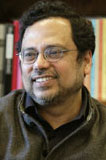 • Uppsala seminar with Dipesh Chakrabarty
• Uppsala seminar with Dipesh Chakrabarty
Dipesh Chakrabarty, Professor of History, South Asian Languages, and Civilizations at Chicago University, USA, will lecture in Uppsala on Monday 27 April 2009, 14.15–16.00. He will talk about ”Between globalization and global warming: Some thoughts on human history”. The seminar is again organised by the South Asia Seminar at Uppsala University. Prof. Chakrabarty is also
a Faculty Fellow of the Chicago Center for
Contemporary Theory, holds a visiting position at the Research School
of Humanities at the Australian National University, and an Honorary
Professorial Fellowship with the School of Historical Studies at the
University of Melbourne, Australia . He is a founding member of the
editorial collective of Subaltern Studies, a co-editor of Critical
Inquiry, and a founding editor of Postcolonial Studies. He has also
served on the editorial boards of the American Historical Review and
Public Culture. Chakrabarty's books include: Rethinking Working-Class History: Bengal
1890-1940 (Princeton: 1989, 2000); and Provincializing Europe:
Postcolonial Thought and Historical Difference (Princeton, 2000;
second edn. forthcoming in 2007). Venue: Dept. of History, Room 1-1062, Thunbergsvägen 3 A (Campus Engelska parken), Uppsala. More information, and link to a short text by Chakrabarty that can be downloaded.
• SUM Seminar with Mizanur Rahman
 Prof. Mizanur Rahman from the Law Faculty at the University of Dhaka, Bangladesh, lectures in Oslo on Wednesday 29 April 2009, 10.00–11.30. The title of his presentation is ”Rebellious Lawyering for the Empowerment of the Poor: A New Jurisprudence of Insurgency?”. The seminar is organised by the Centre for Development and the Environment (SUM) at the University of Oslo, and is part of a seminar series run by SUM during the Spring 2009, with the overall theme ”Poverty and Development in the 21st Century (PAD)”. In his presentation, Prof. Rahman will focus on the fact that post-colonial legal education in South Asia has not succeeded in generating interest on poverty among lawyers. Indeed, in many instances, the laws of the colonial epoch have been given new life and the objectives and form of lawyering have largely continued to replicate the ‘traditional’ model wherein the lawyer retains a ‘position of power’ vis-à-vis the poor client. And the emergence of jurisprudence on Public Interest Litigation (PIL), despite its initial strong appeal, has mainly contributed to the maintenance of the status-quo and thus not resulted in any substantial empowerment of the poor. Some recent experiments in Bangladesh will also be discussed. Venue: Seminar room, 4th floor, SUM, University of Oslo, Sognsveien 68 (near 'Ullevål Stadion'), Oslo. More information.
Prof. Mizanur Rahman from the Law Faculty at the University of Dhaka, Bangladesh, lectures in Oslo on Wednesday 29 April 2009, 10.00–11.30. The title of his presentation is ”Rebellious Lawyering for the Empowerment of the Poor: A New Jurisprudence of Insurgency?”. The seminar is organised by the Centre for Development and the Environment (SUM) at the University of Oslo, and is part of a seminar series run by SUM during the Spring 2009, with the overall theme ”Poverty and Development in the 21st Century (PAD)”. In his presentation, Prof. Rahman will focus on the fact that post-colonial legal education in South Asia has not succeeded in generating interest on poverty among lawyers. Indeed, in many instances, the laws of the colonial epoch have been given new life and the objectives and form of lawyering have largely continued to replicate the ‘traditional’ model wherein the lawyer retains a ‘position of power’ vis-à-vis the poor client. And the emergence of jurisprudence on Public Interest Litigation (PIL), despite its initial strong appeal, has mainly contributed to the maintenance of the status-quo and thus not resulted in any substantial empowerment of the poor. Some recent experiments in Bangladesh will also be discussed. Venue: Seminar room, 4th floor, SUM, University of Oslo, Sognsveien 68 (near 'Ullevål Stadion'), Oslo. More information.
Business and Politics
• Indo-Swedish MoU on Health Care and Public Health signed in New Delhi
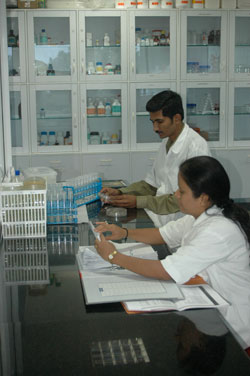 In the presence of the Union Health Minister, Dr. Anbumani Ramadoss, a Memorandum of Understanding on cooperation in the field of health care and public health was signed in New Delhi on 24 February 2009 by Shri Naresh Dayal, Secretary, Health and Family Welfare and H.E Lars-Olof Lindgren, Ambassador of Sweden to India.
The aim of the MoU is to promote bilateral cooperation between the countries in the field of health care and public health on the basis of equality, reciprocity and mutual benefit. The cooperation includes medical education, and research on health and medicine. Sweden has been involved in the health sector in India for many years with a special focus on sexual and reproductive health and rights. The Swedish International Development Cooperation Agency (Sida) financed several major projects involving Swedish researchers for example at the Faculty of Health Sciences, Linköping University (more information). During recent years there has been a shift towards technical collaboration and exchange of knowledge and experiences. More information.
In the presence of the Union Health Minister, Dr. Anbumani Ramadoss, a Memorandum of Understanding on cooperation in the field of health care and public health was signed in New Delhi on 24 February 2009 by Shri Naresh Dayal, Secretary, Health and Family Welfare and H.E Lars-Olof Lindgren, Ambassador of Sweden to India.
The aim of the MoU is to promote bilateral cooperation between the countries in the field of health care and public health on the basis of equality, reciprocity and mutual benefit. The cooperation includes medical education, and research on health and medicine. Sweden has been involved in the health sector in India for many years with a special focus on sexual and reproductive health and rights. The Swedish International Development Cooperation Agency (Sida) financed several major projects involving Swedish researchers for example at the Faculty of Health Sciences, Linköping University (more information). During recent years there has been a shift towards technical collaboration and exchange of knowledge and experiences. More information.
• Information about South Asia related business and politics in Sweden
See SASNET's page, http://www.sasnet.lu.se/polbuss.html
South Asia related culture in Scandinavia
• Bollywood exhibition now on display in Gothenburg
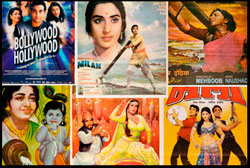 The exhibition "BOLLYWOOD”, is now shown at the Museum of World Cultures in Gothenburg. The exhibition, previously shown at the Museum of Far Eastern Antiquities (Östasiatiska Museet) in Stockholm, takes off in Indian films and shows how contemporary India is connected to its past through stories and myths about love, gods and heroes. What is Bollywood? Why has it become so fantastically popular? Who are the world's most popular movie stars, really? The exhibition is entrance free and continues until 27 September 2009. During this period many programmes with film shows, dance performances and lectures are organised. For example, the film ”Om Shanti Om” will be screened on Wednesday 22 April.
The exhibition "BOLLYWOOD”, is now shown at the Museum of World Cultures in Gothenburg. The exhibition, previously shown at the Museum of Far Eastern Antiquities (Östasiatiska Museet) in Stockholm, takes off in Indian films and shows how contemporary India is connected to its past through stories and myths about love, gods and heroes. What is Bollywood? Why has it become so fantastically popular? Who are the world's most popular movie stars, really? The exhibition is entrance free and continues until 27 September 2009. During this period many programmes with film shows, dance performances and lectures are organised. For example, the film ”Om Shanti Om” will be screened on Wednesday 22 April.
In the exhibition, produced by the Museum of World Culture in cooperation with the Museum of Far Eastern Antiquities and the Helsinki City Art Museum in Finland, the entire family may enjoy experiences from a world that still seems to be far from our daily lives. Or is that really so? In the Bollywood exhibition, the audience can try to be a singing star, record their own Bollywood film and dance in great dance scenes from popular Bollywood movies. The exhibition discusses what Bollywood as a cultural expression actually consists of and how such a massive success can affect your world view. Venue: Världskulturmuseet, Södra Vägen 54, Göteborg. More information.
• Saraswathy Kalakendra Institution of Fine Arts celebrates its fourth Annual Day
Saraswathy Kalakendra Institution of Fine Arts in Huddinge invites for its fourth Annual Day celebration on Saturday 25 April 2009, from 16.00. The Bharata Natyam dance school was started in 2004 by Usha Balasundaram, originally from Kerala and trained at the famous dance institution Kalakshetra College of Fine Arts in Chennai, India. During the annual day celebration, traditional folk dances of India and Bollywood dance will be performed. Venue: ABF Auditorium, Kommunalvägen 26, Huddinge. More information.
• More information about South Asia related culture
in Sweden and Scandinavia
See SASNET’s page, http://www.sasnet.lu.se/culture.html
New and updated items on SASNET web site
• Swedish departments where research on
South Asia is going on:
Constantly added to the list of research environments at Swedish
universities, presented by SASNET. The full list now includes 247 departments,
with detailed descriptions of the South Asia related research and education
taking place! Go to http://www.sasnet.lu.se/environment.html
ƒ Department of Clinical Bacteriology, Sahlgrenska University Hospital, Gothenburg University
ƒ Institute of Health and Care Sciences, Sahlgrenska Academy, Gothenburg University
ƒ Jönköping International Business School (JIBS), Jönköping University
ƒ School of Health Sciences (HHS), Jönköping University
ƒ Department of Nursing Science, Karlstad University
ƒ Division of Clinical Immunology, Department of Laboratory Medicine, Karolinska Institutet
ƒ Faculty of Medicine, Umeå University
• Useful travelling information
Look at http://www.sasnet.lu.se/travelling.html.
Updated travel advises from the The British Foreign & Commonwealth
Office about safety aspects on travelling to the countries of
South Asia.
Best regards,
Lars Eklund
deputy director/webmaster
SASNET/Swedish South Asian Studies Network
SASNET is a national network for research, education, and information about South Asia based at Lund University. Its aim is to promote a dynamic networking process in which Swedish researchers co-operate with researchers in South Asia and globally.
The SASNET network is open to all the sciences. Priority is given to interdisciplinary cooperation across faculties, and more particularly to institutions in the Nordic countries and South Asia. SASNET believes that South Asian studies will be most fruitfully pursued as a cooperative endeavour between researchers in different institutions who have a solid base in their mother disciplines.
The network is financed by Sida (Swedish
International Development Cooperation Agency) and by Lund
University.
Postal address: SASNET – Swedish South Asian Studies Network,
Scheelevägen 15 D, SE-223 70 Lund, Sweden
Visiting address: Ideon Research Park, House Alpha 1 (first floor,
room no. 2040), in the premises of the Centre for East and South
East Asian Studies at Lund University (ACE).
Phone: + 46 46 222 73 40
Fax: + 46 46 222 30 41
E-mail: sasnet@sasnet.lu.se
Web site:
http://www.sasnet.lu.se
SASNET - Swedish South Asian Studies Network/Lund
University
Address: Scheelevägen 15 D, SE-223 70 Lund, Sweden
Phone: +46 46 222 73 40
Webmaster: Lars Eklund
Last updated
2011-01-12
